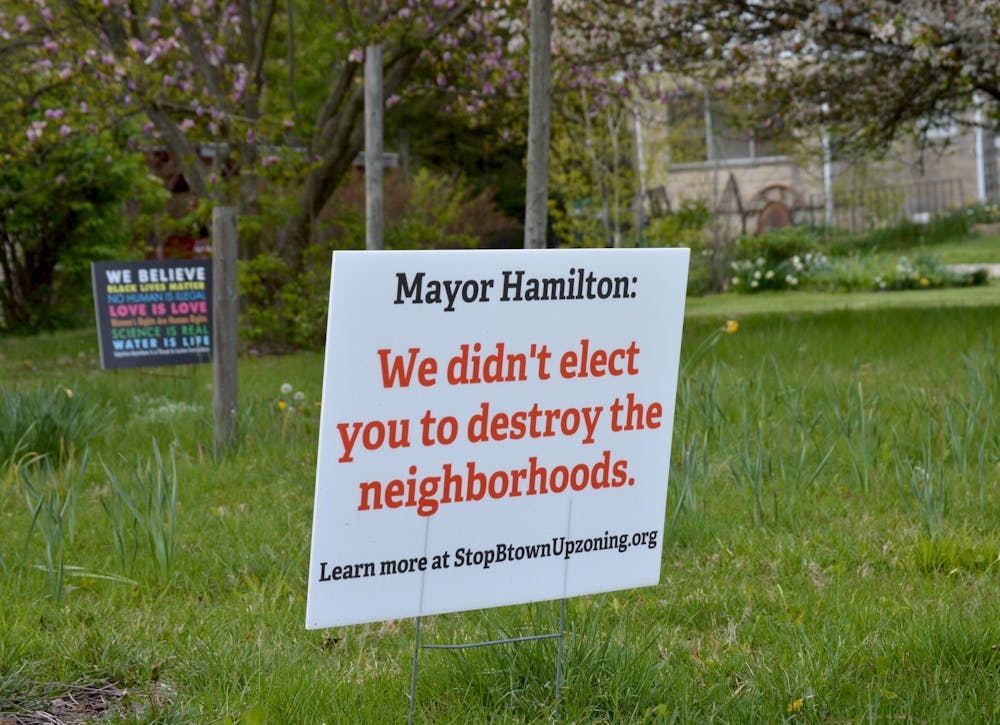The Bloomington City Council passed two major amendments to the Unified Development Ordinance on Thursday after months of community debate and controversy.
The city council passed to amend Ordinance 21-23 by a vote of 6-3, which adds plexes to areas of single family residential neighborhoods with restrictions. Shortly after, they passed to repeal and replace the complementary UDO Official Zoning Map 8-1, which solidified the locations of new zoning districts and changes.
The next step is for Mayor John Hamilton to decide if he will sign the ordinances into law.
The city council has had multiple discussions regarding the UDO and related amendments since they began debate March 28. In this time, they voted on five amendments in which only two were passed.
One amendment the city council passed was amending the Plan Commission’s recommendation May 5 to allow duplexes on a conditional basis, meaning duplex projects must undergo a Board of Zoning Appeals review before the developments are constructed.
They also passed an amendment May 6 which includes duplex development restrictions, such as a maximum cap of 15 newly-constructed plexes in Bloomington per year and a two-year 150 foot buffer of space around a duplex.
Councilmember Matt Flaherty said adding plexes helps the community meet its housing sustainability, affordability and inclusion goals. This ordinance will not entirely fix the housing shortage but is a tool and an important step for the city to address this problem, he said.
“I appreciate the passion for housing, and the variety of issues we've been talking about from all community members, even though there are disagreements,” Flaherty said.
Councilmember Ron Smith said he is concerned Bloomington currently has too many rentals and passing this ordinance will only add more. He said he was surprised the idea of adding plexes in single-family residential neighborhoods was still in the city’s plans after outspoken community feedback against the change.
“I'm kind of stunned that sometimes we're voting against our constituent wishes,” Smith said. “I just can't support this.”
Only a subset of the Bloomington population was heard during these UDO discussions, councilmember Kate Rosenbarger said. A majority of the city lives in rented properties, she said, but public comment has been typically dominated by single-family homeowners.
Rosenbarger said she was shocked to hear comments against allowing renters and students to move into certain neighborhoods.
“If you believe homeownership is the American dream, maybe you should be kinder to those who have not yet been able to attain it,” she said in response.
Passing this ordinance is an incremental step for environmental, economic and social justice in Bloomington, Rosenbarger said.
Councilmember Steve Volan said newcomers to Bloomington, who are oftentimes students, have a place in this zoning debate just as non-student, long-time residents do.
In response to the number of people publicly opposing the UDO changes and those who signed petitions, he said the community is much larger than those voicing their opinion.
“The community is not who shows up. The community is everyone,” Volan said. “I don't only represent the people who speak. I represent 14,000 constituents whether they show up or not.”
Opponents to the UDO felt insulted and took actions personally when others disagreed with them, he said, and these discussions should be an issue separated from personal emotion.
For those who say the UDO process has been unfair, Volan said the city has participated in an extensive, democratic process. Though these discussions have been long, he said the UDO should be revisited every few years.
“I'm confident that we will be able to, as a community, make those changes as we see fit and more often than once every 15 years,” he said.
Councilmember Susan Sandberg said the community needs to heal after the turmoil of this UDO amendment process.
She also said she was disappointed that multiple of her sponsored amendments with councilmember Dave Rollo were not passed, which included rejecting the Plan Commission’s recommendation, creating an affordable housing plan with duplex development and establishing more criteria for duplex development.
“I guess they say that if you reach a compromise, if you've done it correctly, nobody's happy,” Sandberg said. “If that is true, I think this has been a resounding success.”




